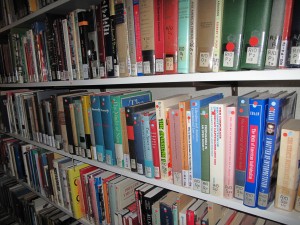Thinking back on people, not books
Last year, I finished my degree in American studies, political science and communications. That means I’ve completed the long journey through Germany’s educational institutions: elementary school, the Gymnasium (high school) and the university are all behind me now.
I think I’ve had a lot of freedom, especially starting in the 11th grade. That’s when we’re able to start choosing some courses that we want to focus on and like the most. But when we think back to our time in school, we remember the people more than all of the studying. I met a lot of my best friends while I was in school. I’m still in contact with some of my teachers even though I finished school seven years ago.
Since I was always a good student, my time in school was fun for me. The only thing that I would criticize on my Gymnasium was that we had few opportunities to prepare for what came after our time in school. Orientation days where we could try out different majors or learn about how to finance our studies weren’t available. So I left school feeling pretty clueless. I wanted to do something in the area of media and communication, but you don’t have to choose any specific major to do that. So I had too much to choose from. At first I studied law. But I quickly noticed that I wasn’t on the right track: Everything was very anonymous, and we would sit all day in these enormous lecture halls with no daylight. I had the feeling that at least three-fourths of my classmates had parents who had studied law – and mine hadn’t. Plus concentrating on just a single area of study was too one-sided for me.
 So I switched my major the next semester to the fields in which I ultimately earned my degree. My studies immediately became more fun for me. The only thing that made me nervous was all of the papers I had to write. How was I supposed to do that? I had no idea how to put together a scholarly paper. And that was clear with my first term paper in political science: I decided to write about the effects of globalization on the concept of the nation state – in just 15 pages! But slowly I figured out how to do this kind of writing. My grades got better, and I applied for a scholarship from the Friedrich Ebert Foundation. After the application process with two interviews, I won a scholarship.
So I switched my major the next semester to the fields in which I ultimately earned my degree. My studies immediately became more fun for me. The only thing that made me nervous was all of the papers I had to write. How was I supposed to do that? I had no idea how to put together a scholarly paper. And that was clear with my first term paper in political science: I decided to write about the effects of globalization on the concept of the nation state – in just 15 pages! But slowly I figured out how to do this kind of writing. My grades got better, and I applied for a scholarship from the Friedrich Ebert Foundation. After the application process with two interviews, I won a scholarship.
That award had a big influence on me. I was getting paid to study what I wanted to! Before that, I was always unsure what value the humanities and social sciences had. But through the financial support, I didn’t have to work alongside my studies anymore and was able to choose my courses entirely based on what interested me and when I wanted to study. At seminars sponsored by the foundation, I also got to know some great people with similar interests. Many of them became my friends. I’m just now beginning to realize how much more I associate education with other people than with specific things I have learned.




